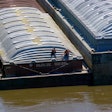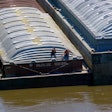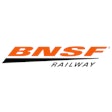
A train collision near Greely, British Columbia, resulted in a significant grain spill and raised concerns about railway safety protocols, according to a Transportation Safety Board of Canada (TSB) investigation report released recently.
On February 16, 2024, a Canadian Pacific Railway Company (CPKC) train collided with a stationary grain train on the north main track of the Mountain Subdivision. The accident caused four cars from the stationary train to derail, with one catching fire and spilling approximately 400 tons of grain.
The TSB investigation found that the moving train, CPKC 805, missed a crucial "Clear to Stop" signal indication due to a distracting call from the rail traffic controller. This oversight led to the train being unprepared to stop at the next signal, resulting in the collision with CPKC 301.
In addition to the grain spill, the accident caused four locomotives from train 805 to derail, with one igniting and leaking about 17,500 liters of diesel fuel. Both crew members on train 805 sustained injuries.
Following the incident, the TSB issued safety advisory letters to Transport Canada and CPKC, highlighting the need for improved physical fail-safe train controls and effective measures to prevent distractions during critical operations.
The TSB report underscores ongoing concerns about railway signal compliance, an issue on the TSB Watchlist since 2012. Despite three recommendations made by the TSB on this safety issue since 2000, progress in implementing additional physical safety defenses remains slow.
"This incident serves as a stark reminder of the potential consequences when railway signals are not properly followed," said a TSB spokesperson. "The grain spill not only represents a significant loss but also highlights the broader safety implications for both railway operations and the communities they serve."
The railway industry and Transport Canada have been in discussions since 2013 to address these safety concerns, but the framework for implementing additional physical safety defenses is not yet sufficiently advanced.


















